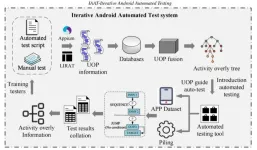(Press-News.org)
Research that could lead to the first early detection blood test for pancreatic cancer has received critical funding from PanKind, The Australian Pancreatic Cancer Foundation.
Pancreatic cancer is one of Australia’s biggest killers, with poor survival rates marred by a lack of distinct symptoms and screening tools needed to detect the disease in its initial stages.
It’s hoped the test will, for the first time, accurately identify patients with early stages of pancreatic cancer – a crucial step towards improving survival rates and quality of life for patients.
At a glance
Project to develop a blood-based test to identify patients with early pancreatic cancer receives PanKind funding boost.
The test is based on a critical WEHI discovery of proteins that can identify early pancreatic cancer in patients. Currently, there are no early detection biomarkers for the disease.
Researchers hope the test could, in future, be used by general practitioners and oncologists as a tool for early intervention to enable more effective treatment options for patients.
Pancreatic cancer is projected to be the fourth biggest cancer killer in Australia this year, with 3600 people predicted to die from the disease.
It is often diagnosed late due to a lack of specific symptoms in the early stages of the disease, meaning most patients are diagnosed once the cancer has grown and has already begun to affect nearby organs.
Project lead Dr Belinda Lee said the new grant would help the team translate their findings into a diagnostic test, potentially improving the lives of hundreds of thousands of people in Australia and around the world.
“There are no early detection biomarkers for pancreatic cancer and this needs to urgently change,” Dr Lee, a consultant medical oncologist at WEHI, said.
“We have identified 13 proteins that could distinguish between the early and late stages of pancreatic ductal adenocarcinoma (PDAC) – the most common type of pancreatic cancer that’s fast-becoming the cancer of our generation.
“While the 5-year survival rate of most other cancers has improved, the incidence and death rate from PDAC is rising – and it’s projected to become the second leading cause of cancer-related death by 2030.
“Even with a diagnosis, there are no biomarkers that can guide clinical decisions for pancreatic cancer, meaning clinicians have limited opportunities to ensure the right, and best, treatment for their patients.
“We hope to validate these proteins and show that they can be used to reliably screen for early pancreatic cancer.
“This would allow us to create the first diagnostic test to identify patients who have early stages of pancreatic cancer – something that unfortunately does not exist at the moment.”
Significant data
To achieve this goal, researchers will leverage the global PURPLE Pancreatic Cancer Translational Registry, established by Dr Lee at WEHI in 2016 with philanthropic support, which also helped the team identify the 13 critical proteins.
The registry is a large-scale database that tracks the treatment journey of patients at 48 cancer centres across Australia, New Zealand and Singapore, with over 4000 patients and 2000 biospecimens currently available.
Data from the registry confirms that 70% of patients present with advanced disease, highlighting the need for biomarkers to enable earlier detection.
“We will utilise state-of-the art technologies and computational methodologies to compare the protein signature in the blood of healthy individuals, to pancreatic cancer patients with early and late-stage disease,” Dr Lee said.
“The results will allow us to identify potential novel blood-based biomarkers that can be further developed to create a simple, non-invasive screening test to identify early-stage pancreatic cancer.
“We hope this test can be used by general practitioners to identify patients with disease, or by oncologists to identify the right treatment for patients.
“The ultimate goal is that this tool leads to earlier diagnosis of this silent cancer, thereby increasing the number of patients who go into remission and helping us triple survival rates by 2030.”
The project, Development of a blood-based test to identify patients with early pancreatic cancer, is supported by PanKind’s $100,000 Marianne Allan Pancreatic Cancer Research Grant.
END
A recent study published in Progress in Neurobiology and led by researchers at the University of Arizona College of Medicine – Tucson has developed an improved method to study Parkinson’s disease in the lab. Along the way, researchers also uncovered clues that may help scientists figure out how to detect Parkinson’s earlier and point the way toward better treatments.
Around a million Americans are living with Parkinson’s disease, a neurological disorder that causes difficulty in movement, balance and cognition. Symptoms worsen until tasks like ...
Warming has played a crucial role in various industrial and agricultural processes throughout history. Night-time warming, however, presents a distinct challenge due to the absence of solar radiation. During the night, direct radiative heat loss to outer space through the atmospheric transparent window (8-14 μm) can cause temperature to drop below freezing, posing significant threats to agriculture (crops), transportation (outdoor cables), and more.
Traditionally, achieving night-time warming ...
With the benefits of reducing time-cost and human efforts, automated testing has been widely used for quality assurance of mobile applications (apps). However, in complex interactive activities, manual testing can achieve higher coverage. However, the effectiveness of manual testing is highly dependent on the vital User Operation Process (UOP) of experienced testers.
To solve the problems, a research team led by Zhenyu CHEN and Chunrong FANG published their new research on 15 Oct 2023 in Frontiers of Computer Science co-published ...
CORVALLIS, Ore. – Oregon State University researchers have been awarded $2 million from the U.S. Department of Agriculture to develop improved ways of preventing stored potatoes from sprouting, particularly in the organic sector.
This research is pivotal given the rapid rise of the organic market in U.S. agriculture, the scientists note.
“The organic potato industry cannot depend on traditional chemical anti-sprouting treatments since synthetic chemicals are banned in certified organic,” said Valtcho Jeliazkov of OSU’s College of Agricultural ...
New research conducted by City of Hope and supported by the American Cancer Society focuses on developing scalable educational interventions to support informed patient decision making and consent, such as online tools and applications that include visual aids or interactive multimedia.
FINDINGS
Cancer genomics experts at City of Hope®, one of the largest cancer research and treatment organizations in the United States, conducted a qualitative study that underscored the importance of properly preparing patients for unanticipated, inheritable genetic findings prior to receipt of ...
Electroconvulsive therapy (ECT), formerly known as electroshock therapy, involves inducing a brief seizure in the brain using controlled doses of electricity. While ECT is highly effective for certain mental illnesses, particularly depression, the reasons for its efficacy have long puzzled the fields of psychiatry and neuroscience.
Now, researchers from University of California San Diego may have an answer. In two new studies published November 16, 2023 in Translational Psychiatry, they propose a new hypothesis that ECT alleviates depression symptoms by increasing aperiodic activity, a type of electrical activity in the brain that doesn’t follow a consistent pattern ...
McWilliams School of Biomedical Informatics at UTHealth Houston reached a funding landmark with 15 faculty members awarded 16 different grants totaling more than $31 million between August and October 2023. Each grant has a focus on medical artificial intelligence (AI) innovations and advancements in research or health care.
“This is an incredible achievement for McWilliams School of Biomedical Informatics; these grants play a key role in advancing informatics research while also expanding on the important role technology continues to play in medicine,” said Jiajie Zhang, PhD, dean and Glassell Family Foundation Distinguished Chair in ...
A debate has broken out over whether Pfizer should have told pregnant women taking part in its maternal respiratory syncytial virus (RSV) vaccine trial that a trial of a similar GSK vaccine was stopped over a safety signal around preterm birth, an investigation by The BMJ can reveal.
Pfizer’s vaccine, called Abrysvo, was recently approved for use in the US and the European Union, but is not yet authorised in the UK.
Some experts have criticised Pfizer for not informing participants, while others believe notification would have been premature and caused unnecessary anxiety, reports freelance investigative journalist Hristio ...
As power generation from sources like solar and wind increases, along with the introduction of devices such as heat pumps and batteries, a new optimisation tool created at the University of Surrey will help the UK plan for a greener electricity network.
The researchers developed an algorithm to model how these smaller networks distributed electricity – factoring in how local grids could become unbalanced by adding too many heat pumps in a single area or generating more electricity than the grid could accept.
The Surrey team found that it was generally more efficient ...
The widespread adoption of nuclear power was predicted by computer simulations more than four decades ago but the continued reliance on fossil fuels for energy shows these simulations need improvement, a new study has shown.
In order to assess the efficacy of energy policies implemented today, a team of researchers looked back at the influential 1980s model that predicted nuclear power would expand dramatically. Energy policies shapes how we produce and use energy, impacting jobs, costs, climate, and security. These policies are generated using simulations (also ...








